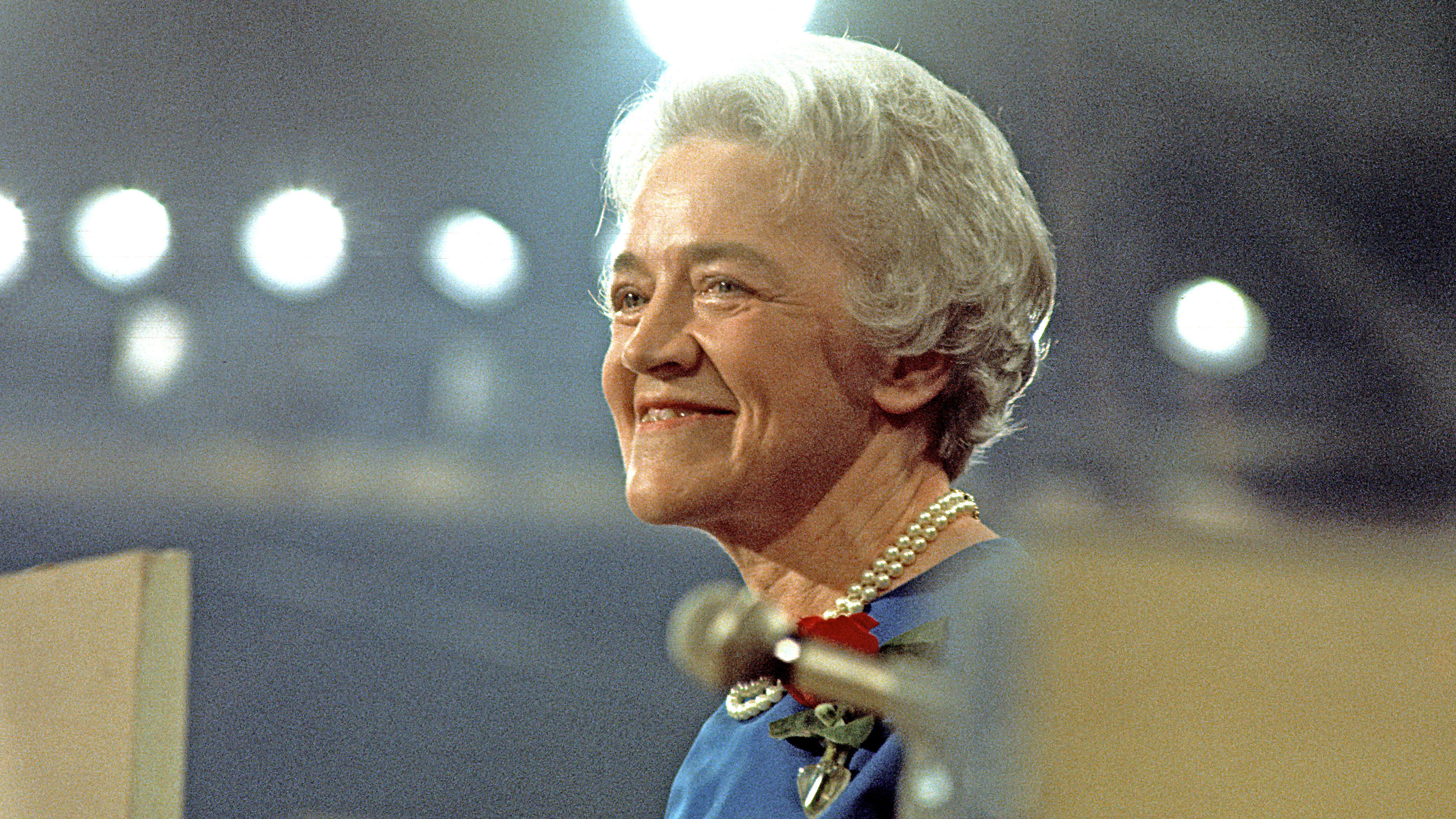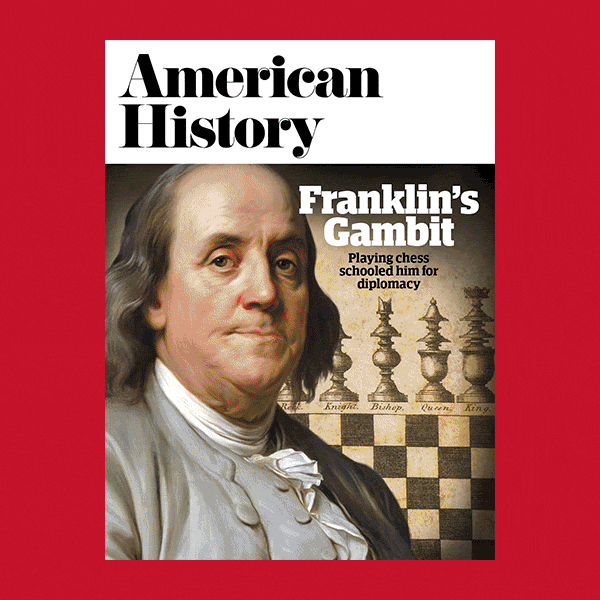On the morning of June 1, 1950, in the subway tunnel beneath the U.S. Capitol, Senators Margaret Chase Smith (R-Maine) and Joseph R. McCarthy (R-Wisconsin) crossed paths. The two presented a study in contrasts. Smith, the only female senator, represented Maine. Small, neatly dressed, and quiet, Smith maintained a stillness overlaying steely determination. Her sole flamboyance was a red rose she wore pinned to her dress every day. McCarthy was gregarious, usually disheveled, perpetually active. Of the junior senator from Wisconsin, a reporter wrote, “He is ignorant, crude, boastful, unaware of either intellectual or social refinements.”
McCarthy had grabbed the national spotlight in February when, delivering a speech in Wheeling, West Virginia, he brandished what he said was a list of known communists serving in the U.S. State Department. Since then, McCarthy’s campaign against subversives in government had gained intensity and notoriety, to Smith’s increasing discomfort. She was preparing to take a stand.
“Margaret, you look very serious,” McCarthy said. “Are you going to make a speech?”
“Yes,” she replied, “and you are not going to like it.”
He did not.
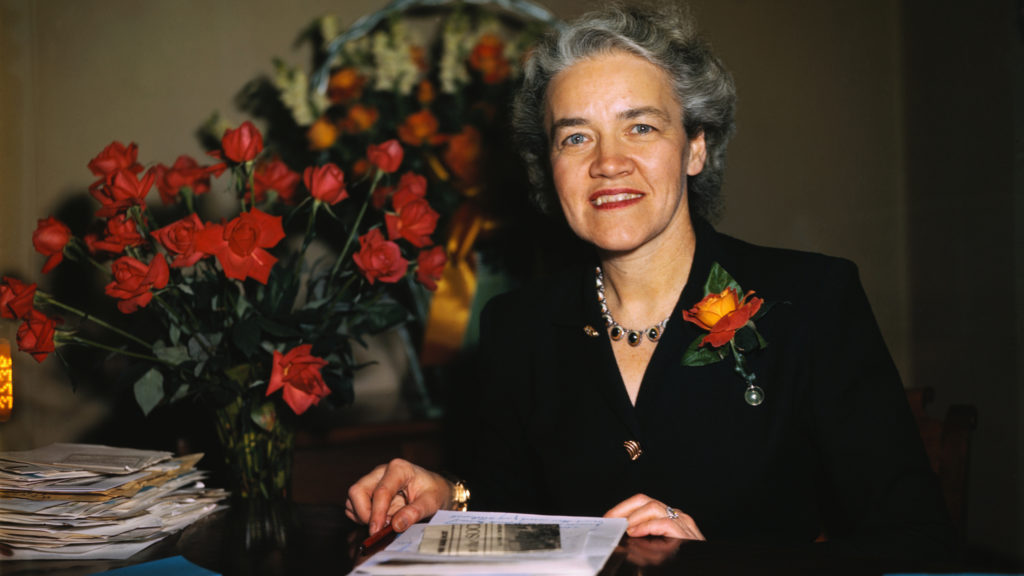
Smith was not only the only woman in the Senate, she was also the only woman in American history to have won election to both houses of Congress. Margaret Madeline Chase was born on December 14, 1897, in Skowhegan, Maine, on the Kennebec River. Her father, a barber, had his shop next door to the family home, which he had built. Her mother picked up such work as she could find. “We didn’t go hungry, but we didn’t have anything,” Smith recalled. At 13, Margaret started clerking at Skowhegan’s five-and-dime, in time moving on to the town telephone switchboard and tax office. After graduating from high school, she taught at a one-room schoolhouse near home and worked for the Skowhegan Independent-Reporter. She never attended college. In 1930, Chase married Clyde Smith, a Republican newspaper publisher who had served as a state legislator, Skowhegan selectman, and state senator. She was 33; he was 54. “It was not a great love, not that kind,” Smith later said. “It was more a business arrangement.”
When Clyde Smith was elected to the U.S. Congress in 1936, Margaret served as his secretary. A syphilitic, Clyde died in April 1940. Running in the special election to fill out his term, Margaret won his seat for the short term and that fall won the regular election. “I had been close to my husband while he was in Congress,” she said. “I knew everything he did, and through him I had been close to many of the congressmen I had to work with now. So I just kept right on doing what I’d been doing. The only thing different was the voting.” Smith was a Republican moderate, inclined to her own course and at times to defy party leadership. Before Pearl Harbor, she backed Franklin Roosevelt’s Lend Lease program to aid Britain, and after the war she endorsed the United Nations and the Marshall Plan to rebuild Europe.
She served three full terms in the House, and when Maine’s Senator Wallace H. White announced he would not run for re-election, Smith ran to replace him, positioning herself as “The Can-Do Candidate with the Can-Did Record.” Her toughest race was in the GOP primary, but she bested three opponents and in the November 1948 cruised to victory.
Joe McCarthy, who had two years on Smith as a senator, came up outside Appleton, Wisconsin, a son of a large Irish-Catholic family with a hardscrabble background. Graduating from Marquette University in 1935, he practiced law in the town of Waupaca. He entered politics as a Democrat committed to Franklin Roosevelt’s New Deal. In 1938, McCarthy set his eyes on the position of circuit judge and beat out the elderly incumbent in a race that saw McCarthy campaign hard and resort to the occasional low blow.
When the country went to war, McCarthy, realizing postwar politics would demand that candidates have war records, joined the U.S. Marine Corps as a lieutenant. He served in the Pacific in a non-combat role as an intelligence officer; the only violence he experienced was a breaking a leg in an equator-crossing ceremony aboard ship. Returning home in 1945 having spun up an image of himself as “Tail Gunner Joe,” he claimed, falsely, to have been wounded in combat. He also had a nose for opponent’s political weaknesses. “To the public McCarthy, life was a game in which no quarter was asked and none given,” wrote David M. Oshinsky in his 1993 book A Conspiracy So Immense: The World of Joe McCarthy. “His approach was so primitive, so cynical, so devoid of commitment to any goal but personal success, that few opponents had the will or the stomach to fight him on his own terms.” McCarthy was the clear underdog when he challenged incumbent senator Robert Lafollette Jr., but he beat Lafollette in the Republican primary and made short work of his Democratic foe in the 1946 general election. As a junior senator, McCarthy displayed disdain for Senate decorum with “a restless and compulsive energy, a hunger for power and public notice, and a casual disregard for custom and authority,” historian Robert Griffith wrote. The private McCarthy was affable and friendly, with an almost compulsive need for affection.
McCarthy began reaching for prominence on February 9, 1950, in Wheeling, West Virginia. In an otherwise ordinary address to the Ohio County Women’s Republican Club, he held up a sheet of paper and, according to reports—no recording of the speech survives—said that on it appeared the names of 205 State Department employees known to belong to the Communist Party, a startling allegation, given that foreign service officer Alger Hiss was being tried on charges of leaking secrets to Soviet agents. Many Americans beheld communism with suspicion, if not fear, kindled by postwar Soviet aggrandizement in Eastern Europe, a 1948 Russian blockade of divided Berlin, the 1949 fall of China to communist forces under Mao Zedong, and that same year the Soviets’ explosion of an atomic bomb.
McCarthy’s hazy complaints resonated. His numbers seemed unsettlingly fluid. He said later that he had 207 names, then the identities of “57 card-carrying members of the Communist Party.” Before the Senate on February 20, he cited “81 loyalty risks.” His examples, from a 1948 FBI inquiry, were often distorted, exaggerated, or fabricated. Still, they reverberated. And what with Democrat Harry Truman in the White House and his party ruling Congress, red-baiting made for an effective Republican cudgel.
Senator Smith, no less a cold warrior than the Wisconsinite, at first took his statements at face value. “It looked as though Joe was onto something disturbing and frightening,” she said. But McCarthy’s claims began to rankle. “Photostatic copies” he said supported his charges seemed to have little to do with them. Cases McCarthy tried to make—such as one that China expert Owen Lattimore was “the top Russian agent” in the United States—didn’t hold water. But as a senator, McCarthy had immunity granted by the Constitution from being prosecuted for anything said on the Senate floor.“Week after week went by with charge after charge by Joe McCarthy which remained unproved,” Smith wrote in her 1972 book, Declaration of Conscience. “My doubts increased.” She concluded that the gentleman from Wisconsin simply could not back up what he was saying.
“To me, in 1950, the communist threat of ‘confuse, divide, and conquer’ was real—but the McCarthy blunderbuss-shotgun approach ultimately was helping to help and serve the communist design of conquest,” Smith said. The Wisconsin senator was creating “an atmosphere of such political fear that people were not only afraid to talk but they were afraid of whom they might be seen with.” Out of partisan fealty, Smith believed it was Democrats’ job to confront McCarthy. She also felt constrained by a tradition that freshman senators were “to be seen and not heard, like good children.” But as McCarthy raged, colleagues on both sides of the aisle, fearing he might turn on them, kept silent. “Joe had the Senate paralyzed with fear,” Smith said.
Unwilling to keep still, Smith decided to draft a brief “declaration of conscience” and circulate it among fellow Senate Republican, in hopes they would sign on. She enlisted six. Vermont’s George D. Aikin agreed first, followed by New Hampshire’s Charles W. Tobey, Oregon’s Wayne L. Morse, New York’s Irving M. Ives, Minnesota’s Edward J. Thye, and New Jersey’s Robert C. Hendrickson.
Home in Maine over Memorial Day weekend, Smith worked on a speech she would give introducing the declaration. She returned to Washington on May 30, and the next day had 200 copies of her impending remarks made. She held off distribution, lest the party leadership get wind of her plan and snaffle it.
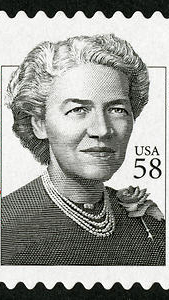
On the Senate floor, Smith stood to speak, two rows ahead of McCarthy. Her aide, Bill Lewis, handed copies to pages for reporters. McCarthy sat covering his face with his hand. “Mr. President, I would like to speak briefly and simply about a serious national condition,” Smith began. “It is a national feeling of fear and frustration that could result in national suicide and the end of everything that we Americans hold dear. It is a condition that comes from the lack of effective leadership either in the legislative branch or the executive branch of our government.”
McCarthy was the topic, but Smith never named him. “The American people are sick and tired of being afraid to speak their minds lest they be politically smeared as ‘communists’ or ‘fascists’ by their opponents,” she said. “Freedom of speech is not what it used to be in America. It has been so abused by some that it is not exercised by others.”
Smith took partisan jabs as well. “The record of the present Democratic administration has provided us with sufficient campaign issues without the necessity of resorting to political smears,” she said. “America is rapidly losing its position as leader of the world simply because the Democratic administration has pitifully failed to provide effective leadership.”
Smith wanted to see the GOP prevail in the coming elections. “But I do not want to see the Republican Party ride to political victory on the Four Horsemen of Calumny—Fear, Ignorance, Bigotry, and Smear,” she said. She finished speaking and sat down. McCarthy left without comment.
Smith’s gesture made a bit of a splash. “Sen. Smith Assails Colleagues,” bannered the next day’s Portland Press Herald. “Says People Sick of Seeing Innocent Victims Smeared.” The Bangor Daily News blared, “Sen. Smith In Blistering Attack On Both Sides For Red Probe Tactics.” Smith made the cover of the June 12 Newsweek. “What many a bewildered citizen had waited to hear for a long time was said by a woman last week,” the magazine reported. “The diminutive lady from Maine struck precisely the right note. She is attractive and self-possessed—but with a man-sized will. She has gone far and wants to go farther, and is in an excellent position to do so.”
At a June 1 press conference, President Truman joked that “he wouldn’t want to say anything that bad about the Republican Party.” But days later over lunch Truman told Smith, “Your Declaration of Conscience was one of the finest things that has happened here in Washington in all my years in the Senate and the White House.”
Retribution was slow catching up with McCarthy. The day after Smith’s speech he was on the Senate floor vowing to fight against communism “regardless of what any group in this Senate or in the administration might do.” He dubbed Smith and the Republican who signed her declaration “Snow White and the Seven Dwarfs,” counting New Jerseyan H. Alexander Smith, who had not signed but did endorse the document. In January 1951, McCarthy removed Smith from his permanent investigations subcommittee and replaced her with Representative Richard Nixon (R-California). Smith learned of the move when McCarthy had a subordinate slip a note under her office door after hours.
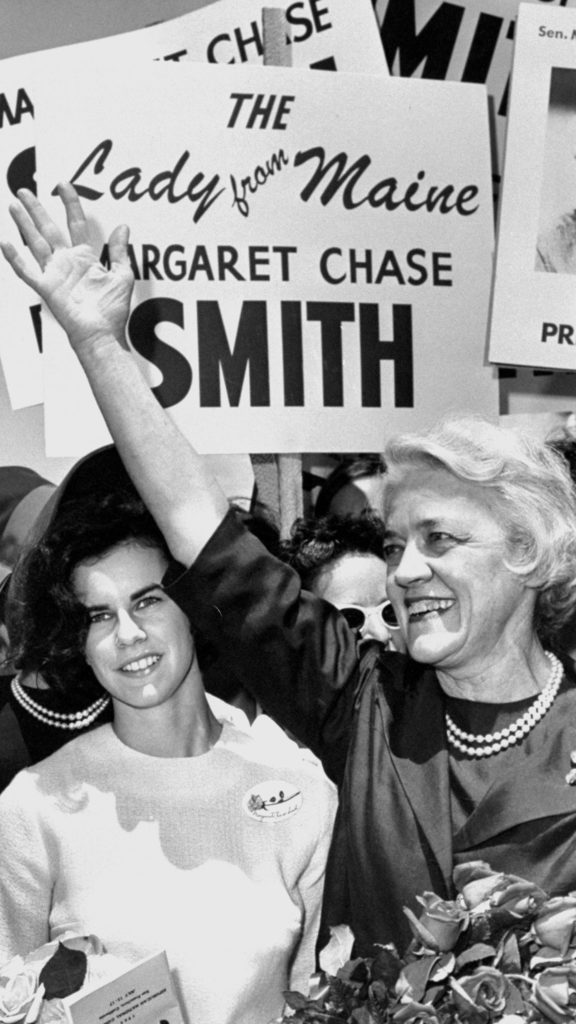
Smith’s declaration opened no floodgates of criticism, nor do much to slow McCarthy’s advance. “Politically speaking, the Declaration had no real impact,” wrote Oshinsky. Even senators who signed it began to distance themselves. Ives later offered McCarthy his “full cooperation.” Tobey said the Wisconsin senator’s “objectives are good.” H. Alexander Smith decided it was better to “convert” McCarthy rather than reprimand him in public. Smith by herself could do little in that climate, but she continued to signal opposition. On June 14, 1951, McCarthy attacked Defense Secretary George Marshall and Secretary of State Dean Acheson as patsies for the communists, spurring Smith to have her declaration reentered into the Senate record. “What I said then is even more applicable today, particularly in view of the statements made in the past few days,” she announced.
Smith got some payback as a member of a subcommittee investigating the 1950 Maryland elections that cost McCarthy foe Senator Millard Tydings (D-Maryland), his seat. Among agitprop brought to bear against Tydings was a brochure featuring a photo of Tydings chatting with Earl Browder, head of the American Communist Party. That meeting never occurred; McCarthy staffers, using darkroom wizardry, had sandwiched film negatives to create a composite image. Smith supported a report sharply critical of McCarthy, but to get the Republican leadership to issue it, she had to push. McCarthy attacked the report, calling it biased. A third time, Smith had her Declaration of Conscience entered into the record.
McCarthy also struck back indirectly. Jack Lait and Lee Mortimer, newspapermen and coauthors of the 1952 redbaiting exercise U.S.A. Confidential, cited Smith as “a lesson in why women should not be in politics. When men argue matters of high policy they usually forget their grudges at the door. She takes every opposing speech as a personal affront and lies awake nights scheming how to ‘get even.’ She is sincere—but a dame—and she reacts to all situations as a woman scorned, not as a representative of the people.” The two characterized Smith as a “left-wing apologist” and tried to link her with a State Department employee McCarthy had attacked as a security risk. Smith sued for libel, winning a $15,000 settlement and a stipulation that Lait and Mortimer run apologetic ads in Maine newspapers—a small victory, but victory nonetheless.
McCarthy, who had won reelection to the Senate in 1952, took a swing at Smith in 1954, when she was up for reelection, by backing her primary opponent to the point of making public appearances on his behalf in Maine. Smith won handily, a setback and an augury for McCarthy. Even with Republican Dwight D. Eisenhower in the White House and the GOP controlling Congress, he continued his careen, seeing reds everywhere—at the Voice of America, the International Information Agency, the U.S. Signal Corps, even the U.S. Army writ large.
After winning despite McCarthy’s ministrations, Smith traveled the globe, meeting with Winston Churchill, Francisco Franco, and Soviet Foreign Minister V.M. Molotov, among other leaders. However, she took care to split her itinerary so she could be in Washington, DC, on December 2 to join fellow senators voting 67-22 to censure McCarthy for behavior “contrary to senatorial tradition.”
McCarthy, a spent force, faded away, dying on May 2, 1957. Smith remained in the Senate and in 1964 had her name entered as a GOP presidential nominee, the first by a woman for a mainstream party. Defeated for re-election in 1972, Margaret Chase Smith retired. She was 97 when she died in 1995, still remembered as the “conscience of the Senate.”

